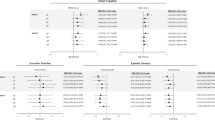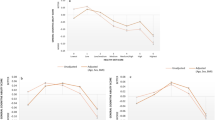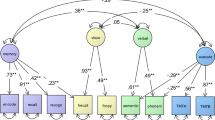Abstract
Background/Objectives:
Fish intake and the long-chain omega-3 polyunsaturated fatty acids (PUFAs) in fish have been suggested to lower the risk of cognitive decline. We assessed whether serum long-chain omega-3 PUFAs eicosapentaenoic acid (EPA), docosapentaenoic acid (DPA) and docosahexaenoic acid (DHA) are associated with performance on neuropsychological tests in an older population and whether exposure to methylmercury, mainly from fish, or apolipoprotein-E4 (Apo-E4) phenotype can modify the associations.
Subjects/Methods:
A total of 768 participants from the population-based Kuopio Ischaemic Heart Disease Risk Factor Study were included. Cognitive function was measured using five neuropsychological tests: the Trail Making Test, the Verbal Fluency Test, the Selective Reminding Test, the Visual Reproduction Test and the Mini Mental State Exam. Multivariate-adjusted analysis of covariance and linear regression were used to analyze the cross-sectional associations.
Results:
We found statistically significant associations between serum EPA+DPA+DHA and better performance in the Trail Making Test and the Verbal Fluency Test. The individual associations with EPA and DHA were similar with the findings with EPA+DPA+DHA, although the associations with DHA were stronger. No associations were observed with serum DPA. Pubic hair mercury content was associated only with a worse performance in the Trail Making Test, and mercury had only little impact on the associations between the serum PUFAs and cognitive performance. Apo-E4 phenotype did not modify the associations with PUFAs or mercury.
Conclusions:
Higher serum long-chain omega-3 PUFA concentrations were associated with better performance on neuropsychological tests of frontal lobe functioning in older men and women. Mercury exposure or Apo-E4 phenotype had little impact on cognitive performance.
This is a preview of subscription content, access via your institution
Access options
Subscribe to this journal
Receive 12 print issues and online access
$259.00 per year
only $21.58 per issue
Buy this article
- Purchase on Springer Link
- Instant access to full article PDF
Prices may be subject to local taxes which are calculated during checkout
Similar content being viewed by others
References
WHO. World Health Organization. www.who.int. Accessed on 23 April 2015.
Daffner KR . Promoting successful cognitive aging: a comprehensive review. J Alzheimers Dis 2010; 19: 1101–1122.
Drag LL, Bieliauskas LA . Contemporary review 2009: cognitive aging. J Geriatr Psychiatry Neurol 2010; 23: 75–93.
Youdim KA, Martin A, Joseph JA . Essential fatty acids and the brain: possible health implications. Int J Dev Neurosci 2000; 18: 383–399.
Joseph J, Cole G, Head E, Ingram D . Nutrition, brain aging, and neurodegeneration. J Neurosci 2009; 29: 12795–12801.
Salem N Jr, Litman B, Kim HY, Gawrisch K . Mechanisms of action of docosahexaenoic acid in the nervous system. Lipids 2001; 36: 945–959.
Carrie I, Abellan Van Kan G, Rolland Y, Gillette-Guyonnet S, Vellas B . PUFA for prevention and treatment of dementia? Curr Pharm Des 2009; 15: 4173–4185.
Yehuda S, Rabinovitz S, Carasso RL, Mostofsky DI . The role of polyunsaturated fatty acids in restoring the aging neuronal membrane. Neurobiol Aging 2002; 23: 843–853.
Bazan NG, Molina MF, Gordon WC . Docosahexaenoic acid signalolipidomics in nutrition: Significance in aging, neuroinflammation, macular degeneration, Alzheimer's, and other neurodegenerative diseases. Annu Rev Nutr 2011; 31: 321–351.
Robinson JG, Ijioma N, Harris W . Omega-3 fatty acids and cognitive function in women. Womens Health (Lond Engl) 2010; 6: 119–134.
Virtanen JK, Siscovick DS, Lemaitre RN, Longstreth WT, Spiegelman D, Rimm EB et al. Circulating omega-3 polyunsaturated fatty acids and subclinical brain abnormalities on MRI in older adults: The Cardiovascular Health Study. J Am Heart Assoc 2013; 2: e000305.
Waitzberg DL, Garla P . Contribution of omega-3 fatty acids for memory and cognitive function. Nutr Hosp 2014; 30: 467–477.
Otsuka R, Tange C, Nishita Y, Kato Y, Imai T, Ando F et al. Serum docosahexaenoic and eicosapentaenoic acid and risk of cognitive decline over 10 years among elderly japanese. Eur J Clin Nutr 2014; 68: 503–509.
Mazereeuw G, Lanctot KL, Chau SA, Swardfager W, Herrmann N . Effects of omega-3 fatty acids on cognitive performance: a meta-analysis. Neurobiol Aging 2012; 33: e17–e29.
Lopez LB, Kritz-Silverstein D, Barrett Connor E . High dietary and plasma levels of the omega-3 fatty acid docosahexaenoic acid are associated with decreased dementia risk: The Rancho Bernardo Study. J Nutr Health Aging 2011; 15: 25–31.
Dullemeijer C, Durga J, Brouwer IA, van de Rest O, Kok FJ, Brummer RJ et al. N 3 fatty acid proportions in plasma and cognitive performance in older adults. Am J Clin Nutr 2007; 86: 1479–1485.
Ammann EM, Pottala JV, Harris WS, Espeland MA, Wallace R, Denburg NL et al. Omega-3 fatty acids and domain-specific cognitive aging: Secondary analyses of data from WHISCA. Neurology 2013; 81: 1484–1491.
Kroger E, Verreault R, Carmichael PH, Lindsay J, Julien P, Dewailly E et al. Omega-3 fatty acids and risk of dementia: The Canadian Study of Health and Aging. Am J Clin Nutr 2009; 90: 184–192.
Jiao J, Li Q, Chu J, Zeng W, Yang M, Zhu S . Effect of n-3 PUFA supplementation on cognitive function throughout the life span from infancy to old age: A systematic review and meta-analysis of randomized controlled trials. Am J Clin Nutr 2014; 100: 1422–1436.
Cooper RE, Tye C, Kuntsi J, Vassos E, Asherson P . Omega-3 polyunsaturated fatty acid supplementation and cognition: A systematic review and meta-analysis. J Psychopharmacol 2015; 29: 753–763.
Roman HA, Walsh TL, Coull BA, Dewailly É, Guallar E, Hattis D et al. Evaluation of the cardiovascular effects of methylmercury exposures: Current evidence supports development of a dose-response function for regulatory benefits analysis. Environ Health Perspect 2011; 119: 607–614.
Olivieri G, Brack C, Muller-Spahn F, Stähelin HB, Herrmann M, Renard P et al. Mercury induces cell cytotoxicity and oxidative stress and increases beta-amyloid secretion and tau phosphorylation in SHSY5Y neuroblastoma cells. J Neurochem 2000; 74: 231–236.
Monnet-Tschudi F, Zurich MG, Boschat C, Corbaz A, Honegger P . Involvement of environmental mercury and lead in the etiology of neurodegenerative diseases. Rev Environ Health 2006; 21: 105–117.
Bjorkman L, Lundekvam BF, Laegreid T, Bertelsen BI, Morild I, Lilleng P et al. Mercury in human brain, blood, muscle and toenails in relation to exposure: An autopsy study. Environ Health 2007; 6: 30.
Virtanen JK, Voutilainen S, Rissanen TH, Mursu J, Tuomainen TP, Korhonen MJ et al. Mercury, fish oils, and risk of acute coronary events and cardiovascular disease, coronary heart disease, and all-cause mortality in men in Eastern Finland. Arterioscler Thromb Vasc Biol 2005; 25: 228–233.
Guallar E, Sanz-Gallardo MI, van't Veer P, Bode P, Aro A, Gómez-Aracena J et al. Mercury, fish oils, and the risk of myocardial infarction. N Engl J Med 2002; 347: 1747–1754.
Whalley LJ, Deary IJ, Starr JM, Wahle KW, Rance KA, Bourne VJ et al. N-3 fatty acid erythrocyte membrane content, APOE varepsilon4, and cognitive variation: An observational follow-up study in late adulthood. Am J Clin Nutr 2008; 87: 449–454.
Green RC, Roberts JS, Cupples LA, Relkin NR, Whitehouse PJ, Brown T et al. Disclosure of APOE genotype for risk of Alzheimer's disease. N Engl J Med 2009; 361: 245–254.
Salonen JT . Is there a continuing need for longitudinal epidemiologic research? The Kuopio Ischaemic Heart Disease Risk Factor Study. Ann Clin Res 1988; 20: 46–50.
Reitan RM . Validity of the trail making test as an indicator of organic brain damage. Percept Mot Skills 1958; 8: 271–276.
Buschke H, Altman Fuld P . Evaluating storage, retention, and retrieval in disordered memory and learning. Neurology 1974; 24: 1019–1025.
Borkowski JG, Benton AL, Spreen O . Word fluency and brain damage. Neuropsychologica 1967; 5: 135–140.
Russell EW . A multiple scoring method for the assessment of complex memory functions. J Consul Clin Psychol 1975; 43: 800–809.
Folstein MF, Folstein SE, McHugh PR . "Mini-mental state". A practical method for grading the cognitive state of patients for the clinician. J Psychiatr Res 1975; 12: 189–198.
Koivisto K . Population-Based Dementia Screening Program in the City of Kuopio, Eastern Finland. University of Kuopio: Kuopio, 1995.
Strub RL BF . The Mental Status Examination in Neurology. 2nd edn. FA Davis Company: Philadelphia, 1977.
Salonen JT, Nyyssonen K, Korpela H, Tuomilehto J, Seppanen R, Salonen R . High stored iron levels are associated with excess risk of myocardial infarction in Eastern Finnish men. Circulation 1992; 86: 803–811.
Kauhanen J, Kaplan GA, Goldberg DE, Salonen R, Salonen JT . Pattern of alcohol drinking and progression of atherosclerosis. Arterioscler Thromb Vasc Biol 1999; 19: 3001–3006.
Lakka TA, Venalainen JM, Rauramaa R, Salonen R, Tuomilehto J, Salonen JT . Relation of leisure-time physical activity and cardiorespiratory fitness to the risk of acute myocardial infarction. N Engl J Med 1994; 330: 1549–1554.
Salonen JT, Seppanen K, Nyyssonen K, Korpela H, Kauhanen J, Kantola M et al. Intake of mercury from fish, lipid peroxidation, and the risk of myocardial infarction and coronary, cardiovascular, and any death in Eastern Finnish men. Circulation 1995; 91: 645–655.
Baierle M, Vencato PH, Oldenburg L, Bordignon S, Zibetti M, Trentini CM et al. Fatty acid status and its relationship to cognitive decline and homocysteine levels in the elderly. Nutrients 2014; 6: 3624–3640.
Leckie RL, Manuck SB, Bhattacharjee N, Muldoon MF, Flory JM, Erickson KI . Omega-3 fatty acids moderate effects of physical activity on cognitive function. Neuropsychologia 2014; 59: 103–111.
Zhang XW, Hou WS, Li M, Tang ZY . Omega-3 fatty acids and risk of cognitive decline in the elderly: A meta-analysis of randomized controlled trials. Aging Clin Exp Res 2015; 28: 165–166.
Witte AV, Kerti L, Hermannstadter HM, Fiebach JB, Schreiber SJ, Schuchardt JP et al. Long-chain omega-3 fatty acids improve brain function and structure in older adults. Cereb Cortex 2014; 24: 3059–3068.
Dyall SC . Long-chain omega-3 fatty acids and the brain: A review of the independent and shared effects of EPA, DPA and DHA. Front Aging Neurosci 2015; 7: 52.
Parletta N, Milte CM, Meyer BJ . Nutritional modulation of cognitive function and mental health. J Nutr Biochem 2013; 24: 725–743.
Salem N Jr, Vandal M, Calon F . The benefit of docosahexaenoic acid for the adult brain in aging and dementia. Prostaglandins Leukot Essent Fatty Acids 2015; 92: 15–22.
Huang TL . Omega-3 fatty acids, cognitive decline, and alzheimer's disease: A critical review and evaluation of the literature. J Alzheimers Dis 2010; 21: 673–690.
Barcelo-Coblijn G, Murphy EJ . Alpha-linolenic acid and its conversion to longer chain n-3 fatty acids: Benefits for human health and a role in maintaining tissue n-3 fatty acid levels. Prog Lipid Res 2009; 48: 355–374.
Hodson L, Skeaff CM, Fielding BA . Fatty acid composition of adipose tissue and blood in humans and its use as a biomarker of dietary intake. Prog Lipid Res 2008; 47: 348–380.
Acknowledgements
We thank Dr George A Kaplan for his comments in the preparation of the manuscript, Dr Jukka T Salonen for his earlier extensive contribution in the KIHD project and Kimmo Ronkainen, MSc, for data management.
Author information
Authors and Affiliations
Corresponding author
Ethics declarations
Competing interests
The authors declare no conflict of interest.
Additional information
Supplementary Information accompanies this paper on European Journal of Clinical Nutrition website
Rights and permissions
About this article
Cite this article
D'Ascoli, T., Mursu, J., Voutilainen, S. et al. Association between serum long-chain omega-3 polyunsaturated fatty acids and cognitive performance in elderly men and women: The Kuopio Ischaemic Heart Disease Risk Factor Study. Eur J Clin Nutr 70, 970–975 (2016). https://doi.org/10.1038/ejcn.2016.59
Received:
Revised:
Accepted:
Published:
Issue Date:
DOI: https://doi.org/10.1038/ejcn.2016.59
This article is cited by
-
Associations of dairy, meat, and fish intakes with risk of incident dementia and with cognitive performance: the Kuopio Ischaemic Heart Disease Risk Factor Study (KIHD)
European Journal of Nutrition (2022)
-
Associations between Plasmatic Polyunsaturated Fatty Acids Concentrations and Cognitive Status and Decline in Neurocognitive Disorders
The Journal of nutrition, health and aging (2018)



